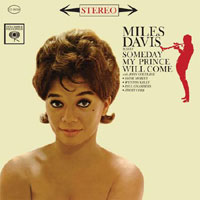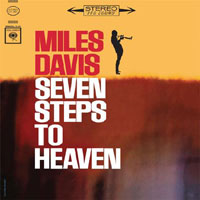Miles Davis • Someday My Prince Will Come
Miles Davis • Seven Steps to Heaven
iles Davis was at the height of his creative powers." This was true about jazz's greatest innovator anytime during a span of nearly thirty years. He dabbled in swing and bop, experimented with hard bop, pioneered modality, and dragged jazz a few giant steps closer to rock. Along the way he was part or principal of no less than a dozen of the greatest jazz recordings and headed some of the most historic ensembles. Miles played with the best, and the best often parlayed their time with him into greater creative autonomy. These two LPs released two years apart are proof not only of Miles' magnetism as a leader, but also the ever-changing roster of celebrated musicians who surrounded him. Someday My Prince Will Come features a close-up of Miles' first wife Frances on the cover and John Coltrane's final playing as part of the Miles Davis Quintet. The famous first Quintet was in transition. Bassist Paul Chambers was still in, as was Philly Joe Jones on drums. But Hank Mobley plays sax on the lion's share of the tunes here, and Jimmy Cobb alternates with Jones. Wynton Kelly takes Red Garland's seat at the piano. Perhaps because of Coltrane's semi-departure, this set is inconsistent -- even stolid in spots, such as during the nine-minute title tune -- though abounding with lyricism. With Seven Steps to Heaven, the Quintet was in outward disarray. Only Miles remained from the lineup that made Someday My Prince Will Come two years earlier, and twenty-somethings Herbie Hancock on piano and Ron Carter on bass, along with teenager Tony Williams on drums, were the rhythmic backbone. But this young blood would infuse the music with newfound urgency and pave the way for the second lineup of the Quintet. The Analogue Productions sound is visceral and crisp in the best sense, and the quiet pressings ensure that no musical detail is even mildly obscured. The leader's muted trumpet is a workout for the phono cartridge and everything downstream. It can sound too hot, too grainy, or simply too irritating. But with these 45rpm LPs, if your system is up to the task, you'll hear boundless high-frequency reach and lavish dynamic nuance and harmonic delicacy. The soundstage is nicely laid out, Miles holding down the middle ground. Half of Seven Steps to Heaven was recorded in New York and half in Hollywood. You will easily notice the different venues, with the sound of the New York numbers getting the slight nod. These recordings don't resolve the debate over which
version of the Miles Davis Quintet was best. In fact, they only stir that wonderful pot
all the more. |


